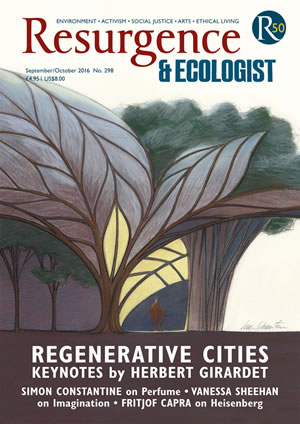We all need food, but increasingly fewer people are growing it. In Britain no more than 3–4% of people are in the business of growing food. The more industrialised and urbanised a country, the fewer people work on the land.
Not only do we not want to grow our food, but many of us also think that the growing of food is of lesser value. Farmers increasingly want their children to get jobs in the cities.
Since we do not wish to work on the land and grow food, we want farming to be industrialised and mechanised. As a result we have a growing number of factory farms and agribusinesses. Today, farmers produce food not so much to feed people as to make money. Food has been turned into a profitable commodity rather than a source of nourishment.
A further consequence of this development is that, since more people in the West are becoming dependent on industrial farming, they start to believe that it is agri-industry, using hybrid seeds, or genetically modified seeds, or chemicals and fertilisers, that will feed the world.
Vandana Shiva challenges this mindset in no uncertain terms. In her new book, Who Really Feeds the World? she makes eight bold statements:
1. Agro-ecology feeds the world – not a violent knowledge paradigm.
2. Living soil feeds the world – not chemical fertilisers.
3. Bees and butterflies feed the world – not poison and pesticides.
4. Biodiversity feeds the world – not toxic monocultures.
5. Small-scale farmers feed the world – not large-scale industrial farms.
6. Seed freedom feeds the world – not seed dictatorship.
7. Localisation feeds the world – not globalisation.
8. Women feed the world – not corporations.
The reality that Vandana points out is that 70% of the world’s food is still grown by small farmers around the world. Further, through careful and thoughtful methods these farmers look after the soil and maintain the fertility of the land, whereas 24 billion tonnes of fertile soil are lost from large-scale industrial farming each year.
Vandana reminds us that no technology can claim to feed the world while it destroys life in the soil. “Degraded and dead soils, soils without organic matter, soils without soil organisms, and soils with no water-holding capacity do not provide food security: they create famines and are at the heart of the food crisis the world is facing today,” she says.
Vandana differentiates between the law of return and the law of exploitation. The law of return is based upon taking from the Earth to meet human needs, and returning the fertility back to the Earth through composting and maintaining the cycle of Nature.
The law of exploitation works under the mindset that the Earth is a lifeless rock, that land is owned by humans and they can do to it what they want. As a result earthworms are gone, other soil organisms are destroyed, and no attention is paid to the fertility and integrity of the soil.
In this profound and well-argued book, Vandana Shiva calls on the world to go through a radical change of thinking. She advocates a transition from a mechanistic and reductionist science to an agro-ecological science based on relationships and interconnectedness so that we grow our food while maintaining the biodiversity and health of the soil.







